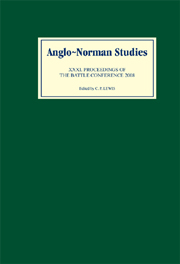Book contents
- Frontmatter
- Contents
- LIST OF ILLUSTRATIONS, MAPS, AND TABLES
- EDITOR'S PREFACE
- ABBREVIATIONS
- Kingship, Lordship, and Community in Eleventh-Century England (R. Allen Brown Memorial Lecture)
- Citadels of God: Monasteries, Violence, and the Struggle for Power in Northern England, 1135–1154
- Writing Civil War in Henry of Huntingdon's Historia Anglorum
- Land, Family, and Depredation: The Case of St Benet of Holme's Manor of Little Melton
- Brothers at Court: Urse de Abetot and Robert Dispenser
- Gerald of Wales and the Prophet Merlin
- The First Hundred Years of the Abbey of Tiron: Institutionalizing the Reform of the Forest Hermits
- All Roads Lead to Chartres: The House of Blois, the Papacy, and the Anglo-Norman Succession of 1135
- The Vita Ædwardi: The Politics of Poetry at Wilton Abbey
- William of Malmesbury, King Henry I, and the Gesta Regum Anglorum
- Twelfth-Century Receptions of a Text: Anglo-Norman Historians and Hegesippus
- LIST OF CONTENTS OF VOLUMES 1–30
Citadels of God: Monasteries, Violence, and the Struggle for Power in Northern England, 1135–1154
Published online by Cambridge University Press: 12 September 2012
- Frontmatter
- Contents
- LIST OF ILLUSTRATIONS, MAPS, AND TABLES
- EDITOR'S PREFACE
- ABBREVIATIONS
- Kingship, Lordship, and Community in Eleventh-Century England (R. Allen Brown Memorial Lecture)
- Citadels of God: Monasteries, Violence, and the Struggle for Power in Northern England, 1135–1154
- Writing Civil War in Henry of Huntingdon's Historia Anglorum
- Land, Family, and Depredation: The Case of St Benet of Holme's Manor of Little Melton
- Brothers at Court: Urse de Abetot and Robert Dispenser
- Gerald of Wales and the Prophet Merlin
- The First Hundred Years of the Abbey of Tiron: Institutionalizing the Reform of the Forest Hermits
- All Roads Lead to Chartres: The House of Blois, the Papacy, and the Anglo-Norman Succession of 1135
- The Vita Ædwardi: The Politics of Poetry at Wilton Abbey
- William of Malmesbury, King Henry I, and the Gesta Regum Anglorum
- Twelfth-Century Receptions of a Text: Anglo-Norman Historians and Hegesippus
- LIST OF CONTENTS OF VOLUMES 1–30
Summary
There were some monastic writers who saw that times of warfare might benefit their order. In describing Ailred's brief but formative period as abbot of Revesby (1143–47), Walter Daniel noted how the prevailing lack of law and order worked to the advantage of the new house. Commenting on grants of land offered to, and received by, the abbot he stated:
he [Ailred] had realised that in this unsettled time such gifts profited knights and monks alike, for in those days it was hard for any to lead the good life unless they were monks or members of some religious order, so disturbed and chaotic was the land, reduced almost to a desert by the malice, slaughters and harryings of evil men. And so he desired that that land, for which almost all men were fighting to the death, should pass into the hands of the monks for their good; and he knew that to give what they had helped the possessors of goods to their salvation, and that if they did not give, they might well lose both life and goods without any payment in return.
The view expressed here was that monastic houses were havens of peace and security – in contrast to the ‘disturbed and chaotic land’ – and that monks, sustained by the gifts of the good and the not-so-good (perhaps in this period the latter particularly), could engage in another kind of combat for the salvation of souls.
- Type
- Chapter
- Information
- Anglo-Norman Studies 31Proceedings of the Battle Conference 2008, pp. 17 - 30Publisher: Boydell & BrewerPrint publication year: 2009



